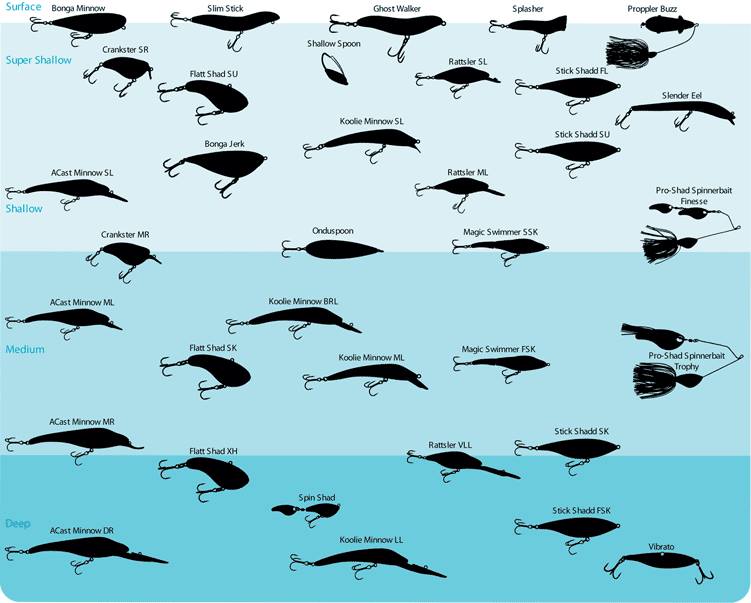Freshwater Fishing Lures for the Entire Water Column
By Andy Whitcomb
Sep 28, 2015
Sometimes I am asked, “Do you really need all these lures?”And my answer is always an emphatic, “maybe!”
Sometimes I am asked, “Do you really need all these lures?”And my answer is always an emphatic, “maybe!”
There is no one freshwater fishing lure that will do everything. In addition to variations in colors and actions, there is depth to consider. With changes in depth, other factors will fluctuate such as light, temperature, and oxygen concentration. And these factors all influence fish feeding behavior.

Thermocline Determines Best Freshwater Fishing Lures
Water stratifies sometimes, which is a fancy word meaning: forms layers with differing properties. Enough difference and this stratification earns another fancy term: thermocline. During summer, anglers may discover this barrier and that fish will bite above, but not below the thermocline. This depth varies between bodies of water so it may be helpful to have freshwater fishing lures with various working depths in your collection. But as air cools in the fall, water begins to cool and the lake may “turnover,” bringing an oxygen-starved layer of water to the surface, and may just put fish in a foul mood for a while.
Fishing Lures Should Keep Their Place in the Water Column
Some fishing lures sink after casting and rise in the water column upon retrieval; other lures float and do not dive until retrieved. Not only does a lure need to reach the depth of actively feeding fish, but it needs to stay there. Ideally, it should not just be passing through but it should maximize time in that key zone.
What is that ideal depth?
It depends. One day the fish may be active at 4 feet, but the next day in the same location, you may need a lure that dives to 10 feet or more to get attention. Sometimes you have to follow the bait to decide where to fish. If a school of shad appears at 15 feet on your boat electronics, the big ones are sure to follow. A good depth is just above submerged vegetation, without getting buried and choked in the weeds, but that depth will vary with water clarity, substrate type, and slope.
If there is a weakness in my fishing abilities, it is mid depth, open water. I think I have a pretty good handle on topwater and shallow lures. And the same goes for anything that can be bounced or dragged across the bottom. Everything in between can mystify, so I try to be prepared with a selection of freshwater fishing lures.
Now, if only I had a lure that would reach depth X. And I’d better get one that works a little bit deeper… and one that goes a little shallower… and a fishing license. That’s all I need.









